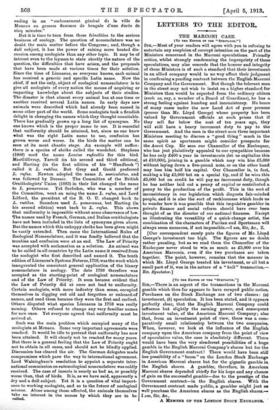LETTERS TO THE EDITOR.
THE MARCONI CASE.
I.To TER EDITOR 07 TILE " SPECTATOR."1
Ssu,—Most of your readers will agree with you in refusing to entertain any suspicion of corrupt intention on the part of the Ministers concerned in the Marconi speculations. Friendly critics, whilst strongly condemning the impropriety of these speculations, may also concede that the honour and integrity of these Ministers is of such a standard that their investment in an allied company would in no way affect their judgment in confirming a pending contract between the English Marconi Company and the Government. But though the tolerant man in the street may not wish to insist on a higher standard for Ministers than would be expected from the ordinary citizen (such as, say, a member of a Board of Guardians), he has a strong feeling against humbug and inconsistency. He bears of many cases under the new Land Act of poor persons (poorer than Mr. Lloyd George) whose property has been valued by Government officials at such prices that if they sell far below the cost of ten years ago, they will still have a heavy increment duty to pay to the Government. And the man in the street sees three important Ministers meeting to discuss a "good thing" much in the same spirit as sportsmen might consider prospects for the Ascot Cup. He sees our Chancellor of the Exchequer, who has just plaintively appealed to our sympathies because he has only £400 a year in investments (let us capitalize this at R10,000), joining in a gamble which may win him £5,000 without laying down a five-pound note, or on the other hand may lose him half his capital. Our Chancellor is, in fact, snaking a big £5,000 bet on a special tip, and if he wins this £5,000 bet on credit he will pay no increment duty, though he has neither laid out a penny of capital or contributed a penny to the production of the profit. This is the sort of inconsistency in our legislation which disgusts fair-minded people, and it is also the sort of recklessness which leads us to wonder how it was possible that this impulsive gambler in private finance and social reform should have ever been thought of as the director of our national finances. Except as illustrating the versatility of a quick-change artist, the combination of the characters of Puritan and Sportsman will always seem nauseous, if not impossible.—I am, Sir, &c., Z.
[Our correspondent surely puts the figures of Mr. Lloyd George's investment too high. The figures are no doubt rather puzzling, but as we read them the Chancellor of the Exchequer never stood to win as much as £5,000 over his
American Marconis, even if the two purchases are taken together. The point, however, remains that the manner in which Mr. Lloyd George treated his investment, or all but a small part of it, was in the nature of a "bull" transaction.— ED. Spectator.]














































 Previous page
Previous page